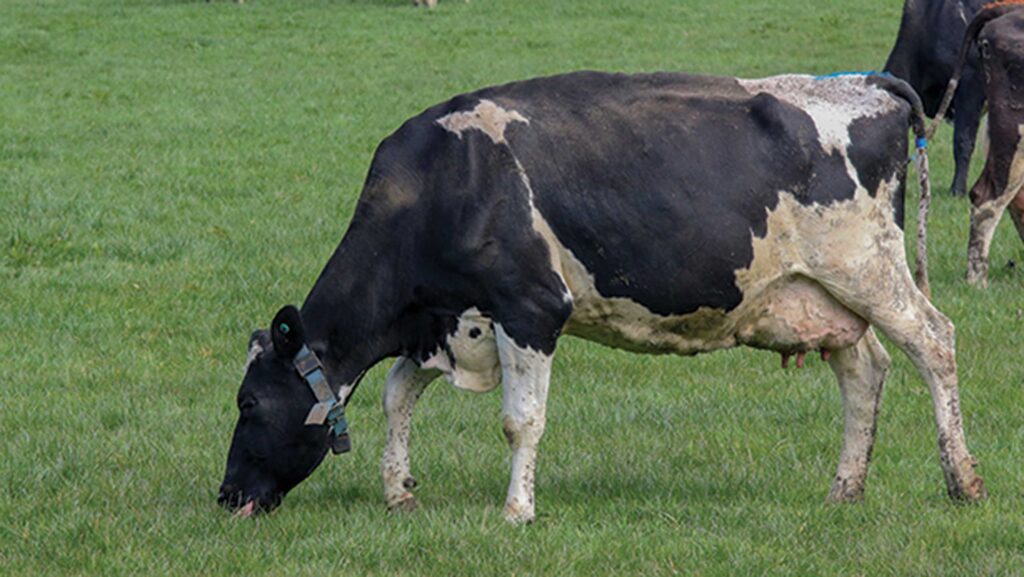Development begins on cow-carried pasture survey monitors
 © Alamy Stock Photo/David Hunter
© Alamy Stock Photo/David Hunter A team of academics at the University of Cambridge has partnered with Rothamsted Research North Wyke to develop a pasture sensor designed to be carried by grazing cows.
The Daisy system uses artificial intelligence to analyse pictures harvested by the collar-mounted cameras, mapping the prevalent plant species to give farmers a better understanding of the biodiversity of swards.
As far as Rothamsted’s researchers are concerned, getting cows to do the legwork makes for a less labour-intensive means of conducting field surveys.
See also: NI farm transforms slurry and food waste into bio-LNG fuel
And by collecting pictures during grazing, fields – including those in remote locations – can be monitored on a continuous basis and the botanical make-up of pastures assessed more frequently.
Should the system be made commercially available, the deeper insights provided will help farmers identify crop trends and, in theory, demonstrate that their multispecies mixes are eligible for government grants.
Lightweight hardware
To keep costs down, the hardware comprises predominantly off-the-shelf components.
These include a standard RGB camera, a microcontroller, and a GPS module that allows every image to be geolocated.
Power comes from a small, rechargeable battery, similar to that of an ATV tracker, that should last for up to a month – based on an image frequency of five an hour.
This is reckoned to be the best balance between thorough data capture and battery usage and, over the course of several weeks, should ensure it harvests shots of almost every square metre of pasture.
To increase the likelihood of complete field coverage, the development team envisages fitting camera collars to between three and five cows in the herd.
Ideally, these would be the most dominant and active animals; research suggests that most will cover a whole field in just a few days.
The hardware is housed in a robust case on the side of the collar, where movements are gentler and the chance of getting crisp images far higher.
A weight on the bottom of the collar should hold it in position with the camera pointing downwards.
One of the project’s priorities is to keep production costs to a minimum. Single units are likely to be less than £50, excluding a dedicated collar (£5-7).
However, it should be possible to integrate the kit into the cow collars already used on some progressive dairy units.
Analysing the data
Pictures taken by the cameras are stored locally on the device until it is practical to get access to them.
Cows are weighed monthly on Rothamsted’s research farm in Devon, where the trials will take place, which provides an ideal opportunity to extract the data.
This can be downloaded manually or uploaded to the cloud via wi-fi.
To analyse the raw images, the team is currently using publicly available algorithms that save the time and cost associated with developing bespoke software models.
These classify common plant types – grass, clover, dock, buttercup – as well as highlighting bare soil and dung.
The exact geographical location of each shot is recorded, allowing the information to be transformed into a “heat map”, with colour coding indicating the prevalence of specific plant species.
This can be combined with other field maps – soil type, variable rate fertiliser applications, biomass assessments and the like – to give a better insight into possible trends.
Doing so could help target desirable species, either for grant funding or herd health reasons, and improve decision-making with regards to overseeding and sward reinvigoration, potentially on a part-field basis to reduce costs.
The three-month development process is expected to conclude in September, after which the team will decide whether to pursue a commercial offering.
Cambridge research
Development of the collar-mounted cameras and data analysis software is being undertaken by the University of Cambridge’s Department of Chemical Engineering and Biotechnology.
It is being funded by the Engineering & Physical Sciences Research Council Centre for Doctoral Training in Sensor Technologies for a Healthy and Sustainable Future.

